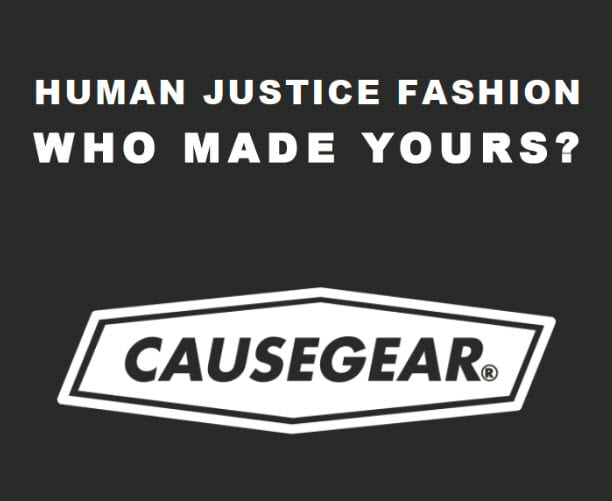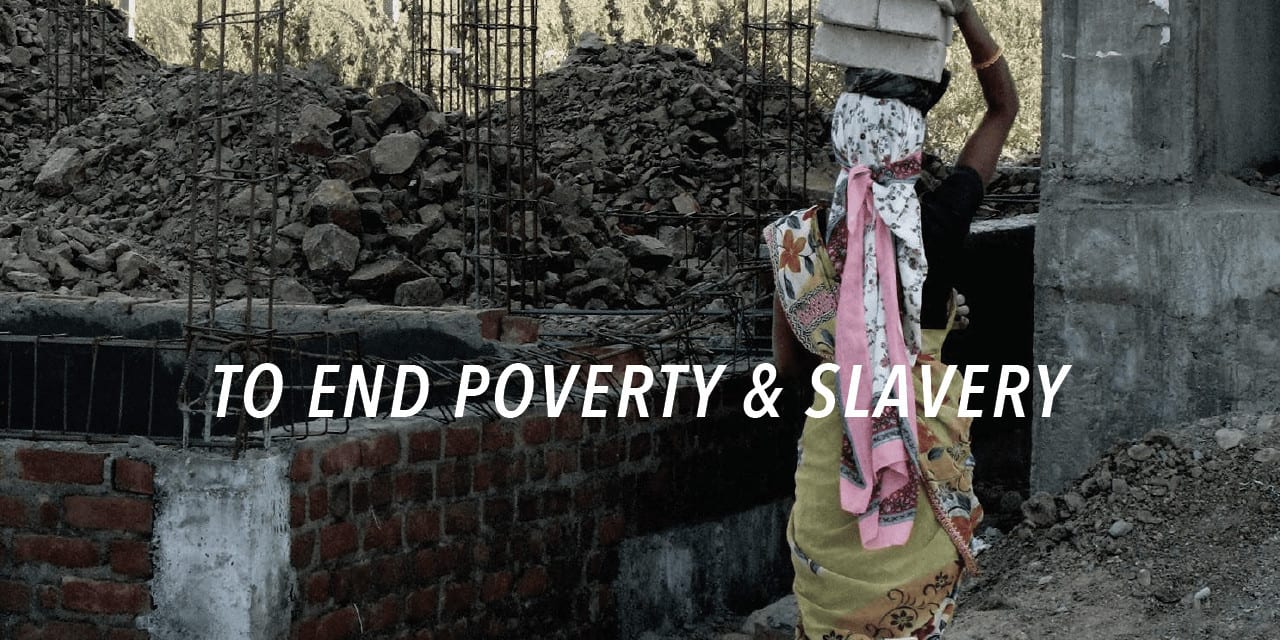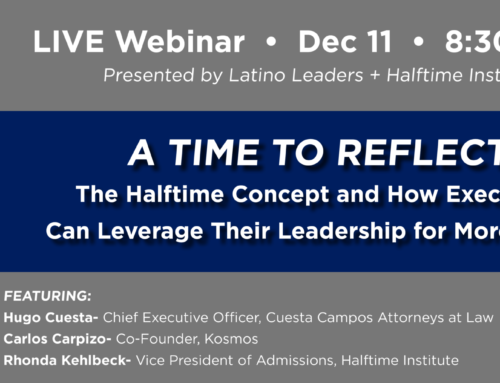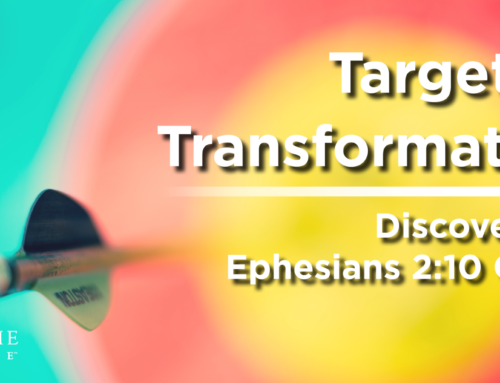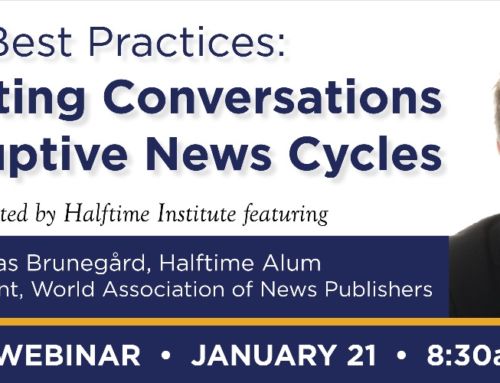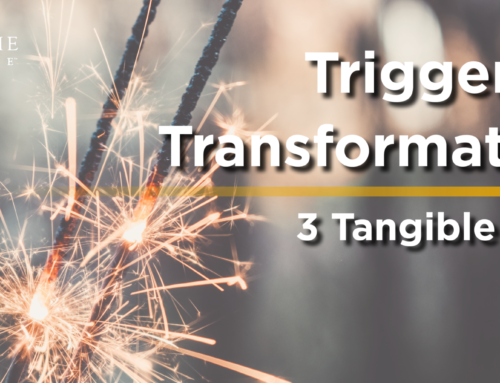Being on the Forefront of Cause Consumerism
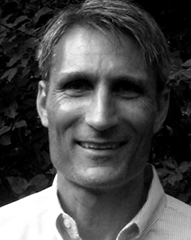 Brad Jeffery is a man with a cause. As the founder, President and CEO of CAUSEGEAR (an L3C low profit social enterprise), his mission in life is to bring justice to the lives of the poverty-stricken people in majority world countries. His journey to discovering what true justice means has been long but fruitful, not only for him but for the many changed lives that testify of his influence.
Brad Jeffery is a man with a cause. As the founder, President and CEO of CAUSEGEAR (an L3C low profit social enterprise), his mission in life is to bring justice to the lives of the poverty-stricken people in majority world countries. His journey to discovering what true justice means has been long but fruitful, not only for him but for the many changed lives that testify of his influence.
Involved in a family business for most of his life, he enjoyed that environment and its challenges and opportunities. But at age 44, when he experienced a life-changing encounter with Christ, he faced a point of decision. “I was really wrestling with this separation of my faith world and my business passions and pursuits. They weren’t as linked as I thought they should be…” He found himself more interested in serving in church and missions opportunities than his job. “I was more interested in Kingdom work than what the world considers success.” He began to question why business couldn’t be part of living out the great commission, wondering if it was necessary to go into vocational ministry to live a life devoted to Christ.
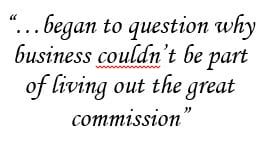 It was at this crucial point in 2005 that some friends invited him to Dallas with them to enroll in the Halftime Institute. “We went down, and through the Launch Event it became very clear to me that my plan was going to be to integrate my faith and my work.” Those two days brought clarity to the questions he had been wrestling with in several ways.
It was at this crucial point in 2005 that some friends invited him to Dallas with them to enroll in the Halftime Institute. “We went down, and through the Launch Event it became very clear to me that my plan was going to be to integrate my faith and my work.” Those two days brought clarity to the questions he had been wrestling with in several ways.
The first thing that Brad remembers having a great impact was an exercise in which Bob Buford asked “what do you want on your t-shirt?” In other words, if you could boil your life down to a slogan that you would want on a shirt, what would it be?
Another exercise was similar. He was asked the question, “if you were to die today, what would people be saying about you at your funeral?” Thinking of what people might say about his life motivated Brad. “I realized those conversations would not reflect the kind of man that I wanted to be.” He knew something had to change.
He was also challenged to set goals for himself that included “when I die I want to be known as a man who made a difference in the world for the ‘least of these,’” a reference to Jesus’ words in the gospel of Matthew. He wanted to find ways to make his work and influence in the business world missional, rather than separate from his faith life. The question was where to start?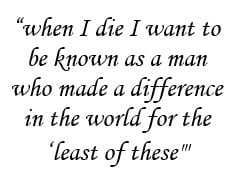
A conversation with a Halftime coach helped to answer that question. Assuring Brad that making his business his dream was possible, his coach gave him a contact in his line of interest. Brad visited them and returned home with a new vision and strategy for giving, core values and mission, which included donating from the profits of the business, community wellness projects and compassionate treatment of employees. For the next three years, the business thrived under these God-honoring principles, but ultimately a profound disagreement on business philosophy strained relationships and Brad left the company.
The split left him financially devastated and unsure what to do next. He sees it as a time in which God tested his commitment and called him to a deeper level of trust. “It was a really hard but beautiful time with the Lord.” For the next two years, he explored his options, and it was then that his interest in social justice, poverty, and the connection with “consumerism tied to cause” came to maturity.
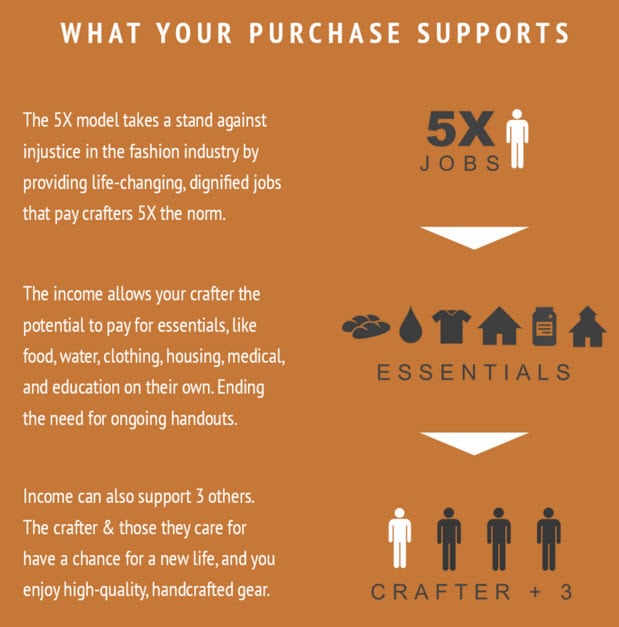 On a trip to majority world countries, learning about their needs and how mission and business could benefit poverty stricken people groups, his ideas formed into a plan. “I was in the Kibera slums of Nairobi when the vision came to me. What if a one-to-one relationship could be created between the fortunate few and the marginalized many in the poorest regions of the world?
On a trip to majority world countries, learning about their needs and how mission and business could benefit poverty stricken people groups, his ideas formed into a plan. “I was in the Kibera slums of Nairobi when the vision came to me. What if a one-to-one relationship could be created between the fortunate few and the marginalized many in the poorest regions of the world?
What if a business could provide life-changing jobs to the poorest on the planet to craft high-quality, handmade, market-relevant fashion?
What if each “crafter” was paid enough to take control of their lives and provide essential family needs (shelter, food, clean water, clothing, and medical)?” It was through this process that CAUSEGEAR was conceived.
Now, six years later, CAUSEGEAR is thriving as a company on the forefront of cause consumerism. Their mission and vision is to make high-quality products, designed in Chicago and made in India by crafters paid 5 times the average workers’ wage. Not a temporal handout, but a sustainable investment in the lives of many who would otherwise have no chance of breaking out of the cycle of poverty and hopelessness.
His hope for the crafters is that this job is a new beginning for them, one in which they can have a better life themselves as well as enough resources to help others around them. And for Brad, this is just the beginning. “As we mature, it is possible that some of the crafters will become part of our leadership team as well.” In these ways, CAUSEGEAR is having the impact Brad has dreamed about for the Kingdom.
Brad also sees how we can all take part in lifting people around the world out of poverty. How can we shift our consumerism for the kingdom? Consider how you consume; can you be more intentional by shifting your consumer dollars to cause-based organizations? “If just 25% of Americans shifted just $65 of their annual fashion spending to CAUSEGEAR (or other organizations like it), one million lives would be transformed.”
There is another cause that Brad is passionate about as well – his Halftime Experience. This had such a profound effect on his life, that he takes every opportunity that he can to tell others about its value. He even hosted a Halftime Experience in Chicago, giving company employees the opportunity to hear about the benefits of going through the Halftime Institute.
His reason is simple. “I want every believer in leadership to see part of our calling as an awesome responsibility and opportunity. To see it as a privilege to live out our faith in the way we conduct business and the way we lead people to be salt and light and to model Christlikeness. There are false beliefs that the only way we can serve Christ in business is to make a ton of money and give it away. The other side of that coin is that many believe running a business by God-honoring principals might compromise profits.
We all have gifts…and whatever you love to do you can do it for the Lord. Going through Halftime doesn’t mean you have to give up everything in order to move from success to significance. You can find significance right where you are by using the gifts and resources God has given you to further His Kingdom.”
What cause do you believe God has given you? Perhaps it’s time to check out the Halftime Institute and let Him show you how to embrace and live out your life purpose. Like Brad, you can be a part of a cohort of peers in this same season of your life figuring it out together.

